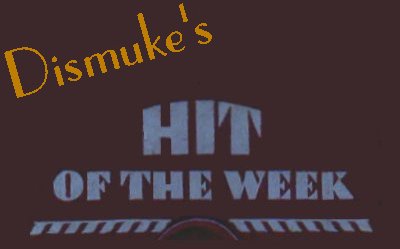

August 2002
August 29, 2002
This week's Hit of the Week is brought
to you by

(From 1931 ad)
Georgia
On My Mind
Louis Armstrong and His Orchestra
1931
(Okeh 41541 mx 405063)
Here is a record that I almost didn't
feature because of its not so great condition. My audio restoration
software, however, surprised me and did a fine job cleaning it up.
Despite the audio blemishes, it is a very enjoyable performance.
August 22, 2002
This week's Hit of the Week is brought
to you by

| "I suppose we'd go pretty
high-hat if a rich uncle left us a million dollars...costly cars, snappy
clothes, fun and travel! But there are a few things that no amount
of wealth would change and one is our mode of travel.
"Pocket money will buy a Greyhound ticket to nearly
anywhere on this continent - but a bank full of greenbacks couldn't duplicate
what that ticket offers us.
"No sleek, special-built limousine can exceed
the riding ease of a Greyhound Super-Coach with its brilliantly designed
body, extra long wheelbase - its four-position reclining chairs, efficient
ventilation and heating. No group of private chauffeurs can equal
the National safety record set by Greyhound drivers.
"Mere money can't buy good fellowship, unusual
human interest and a fascinating close-up look at America, along its great
highways. These come with each Greyhound trip, all include in the
original low fare - a fraction the cost of driving a small private auto"
The
GREYHOUND
LINES
|
(From 1938 ad)
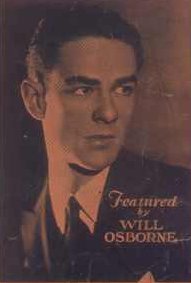
 Audio
File Updated September 11, 2004 Audio
File Updated September 11, 2004
In
The Still Of The Night
Will Osborne and His Orchestra
Joan Whitney, vocal
1937
(Decca 1467 mx 62614)
I think Will Osborne had one of
the nicer sounding bands of the big band era. In the late 1930s,
he adopted a style that he called "Slide Music" based on its emphasis of
slide trombone glissandos. Also note the "wah wah" effects at the
beginning of the selection. Unlike other bands that employed
various musical gimmicks in order to set themselves apart from the pack,
Osborne's is one that I don't tire of listening to for a length of time.
Osborne himelf did a lot of the
band's vocals and was one of the early "crooners." For a while in the early
1930s he was engaged in much publicized rivalry with Rudy Vallee.
The above Osborne photo was taken from a 1929 sheet music cover.
In the early 1940s, Osborne's group became the house band of radio's Abbot
and Costello program.
August 15, 2002
This week's Hit of the Week is brought
to you by
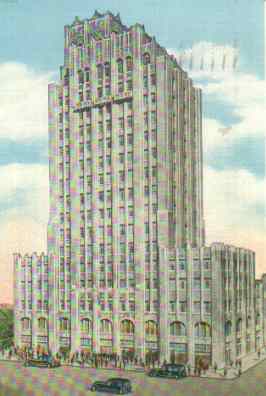
HOTEL WOOTEN
Abilene, Texas
(From 1930 postcard)
Put
On Your Old Grey Bonnet
Casa Loma Orchestra
1931
(Brunswick 6100 mx E36499)
I had announced that this week's
selection would be one by Will Osborne and His Orchestra. Unfortunately,
because of other time demands, it will have to wait until I have a chance
to process it through my audio restoration software. In the meanwhile,
here is a selection that I restored a few weeks ago for inclusion in my
Internet
radio station.
The Casa Loma Orchestra was one
of the more popular bands of the 1930s. It was formed in 1929 around
the remnants of a band called the Orange Blossoms which was part
of the dance band empire of Jean Goldkette. The band was unusual
in that it was a cooperative endeavor owned by the members of the band.
Sax player Glen Gray was the band's president. While the band began recording
under the name of "Glen Gray and the Casa Loma Orchestra" at least as early
as 1933, the band was actually led by Mel Jenssen until 1937 when
Gray started fronting the band. The band was versatile and played
both "hot" and "sweet" arrangements. This rather staccato sounding
selection is typical of the bands early 1930s jazz efforts.
August 8, 2002
This week's Hit of the Week is brought
to you by
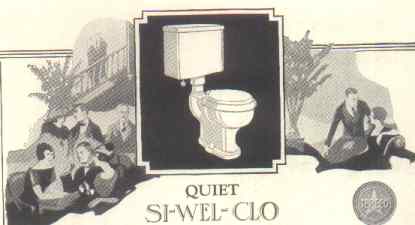
QUIET
SI-WEL-CLO
| A noisy closet in the modern
home is a sign of indifference to the feelings of guests and family.
The Si-wel-clo reduces the noise of flushing to the minimum. It surppresses
a noise you do not want heard and do not want to hear.
In addition to the Si-wel-clo, The Trenton Potteries
Company has developed a group of water closets to meet all types of building
construction, from the big hotel to the modest bungalow. in our "Welling,"
"Merit," and "Saxon" water closets, we have merged as many of the excellencies
of our Quiet Si-wel-clo as possible. Each in its class and at its
price assures you the utmost in value and service.
THE TRENTON POTTERIES CO.
TRENTON, NEW JERSEY, USA
BOSTON
NEW YORK SAN FRANCISCO
|
(From 1922 ad)
Saxarella
Rudy Wiedoeft, saxophone
Frank Banta, piano
1923
(Victor 19167)
This week's selection goes back
to the acoustical (i.e. pre-microphone) era of recording.
Though largely forgotten today,
Rudy Wiedoeft was a phenomenally successful saxophone player in the late
1910s and early 1920s. Many of the charming late ragtime and early
jazz tunes that he performed were of his own composition. He was
especially fond of giving his songs names that ended with the letter "a"
such as this week's selection as well as others like "Saxophobia,"
"Saxema," "Velma," "Gloria," "Valse Erika" etc. By the end
of the 1920s, Wiedoeft's popularity in the United States started to wane
and he spent the early part of the 1930s in Europe where he was still very
much in demand. After he returned to America, Wiedoeft lost what
was left of the fortune he had earned through his music in an ill-fated
gold mining venture. In 1937, he survived a butcher knife stab wound
inflicted by his wife during a quarrel over financial issues. Rudy
Wiedoeft died in 1940 of cirrhosis of the liver at the age of 47.
Wiedoeft has been credited by some
as being largely responsible for the saxophone's later popularity as a
jazz instrument. He left his mark in other areas as well.
In the early 1920s, a young saxophone player and student at the University
of Maine named Herbert was so enamored of Wiedoeft's playing that his friends
started calling him "Rudy." The name stuck and that student, now
remembered as Rudy Vellee, went on to become one of the early stars of
network radio.
August 1, 2002
This week's Hit of the Week is brought
to you by
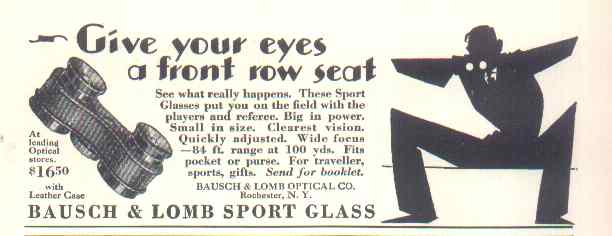
BAUSCH & LOMB SPORT GLASS
(CLICK ON IMAGE FOR LARGER VIEW)
(From 1928 ad)
Roses
of Yesterday
Ben Bernie & His Hotel Roosevelt
Orchestra
Scrappy Lambert & Billy Hillpot,
vocal 1928
(Brunswick 4058)
This week's selection is from the
flip side of the Colonial Club Orchestra selection from a few weeks
back. It is a rather charming song that I was not familiar
with until I came across the record.
This selection provides a good illustration
of both the success and the frustrations I am having while trying to improve
my skills with the audio restoration software. Some of the passages
sound absolutely incredible. On the other hand, I find that
I often have difficulty with high pitched instruments - especially in louder
passages. Observe that some of the louder passages after the vocal
are rather grating and seem a bit too high pitched. What confuses
me about it is that it is precisely the high pitched end of the sound spectrum
that is most most heavily filtered during the noise reduction process.
You will also hear a few subtle "pops" in the recording that I could easily
have removed had I spent more time on it. Every time I use the software,
I usually end up having to strike a balance between quality and time efficiency.

|


